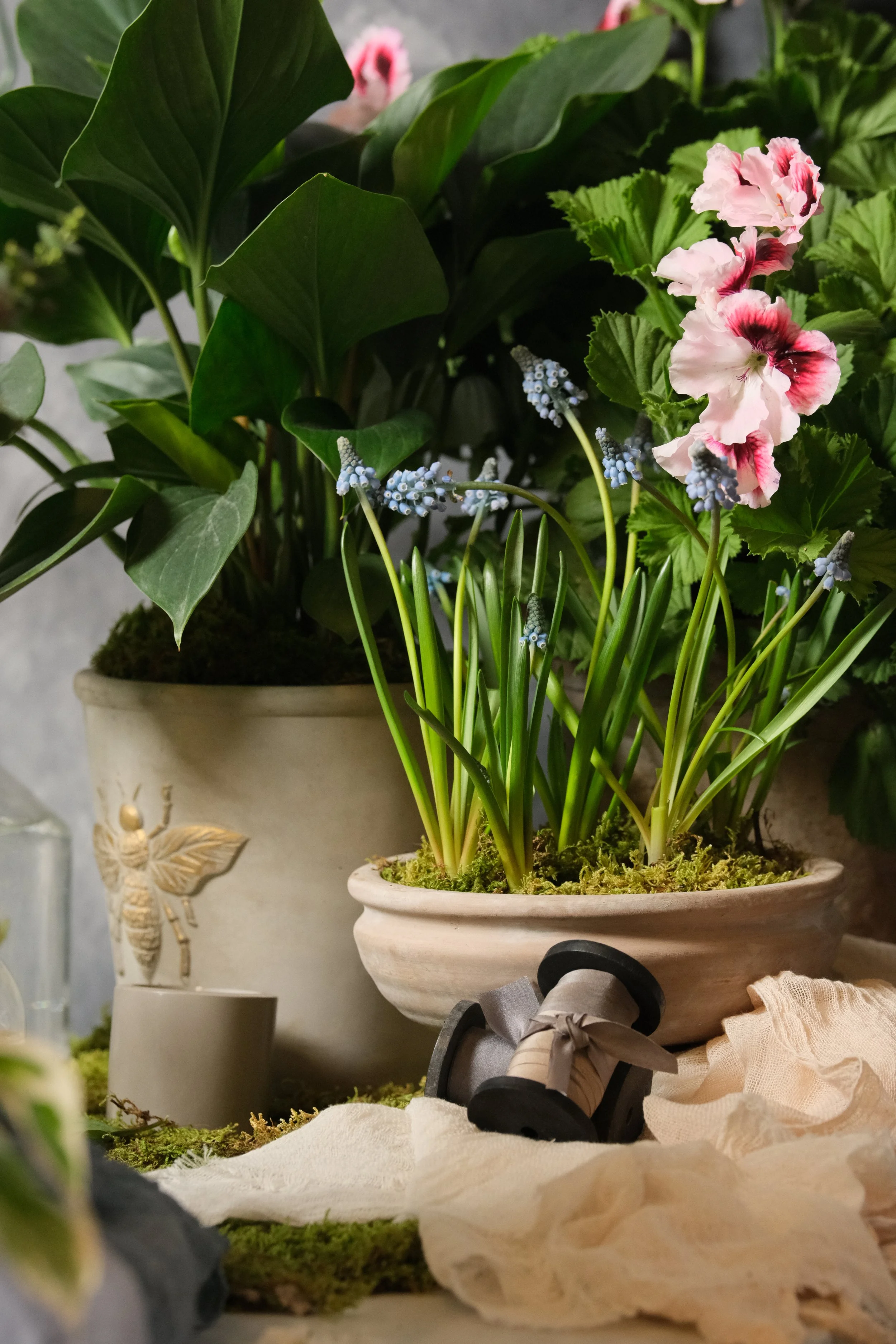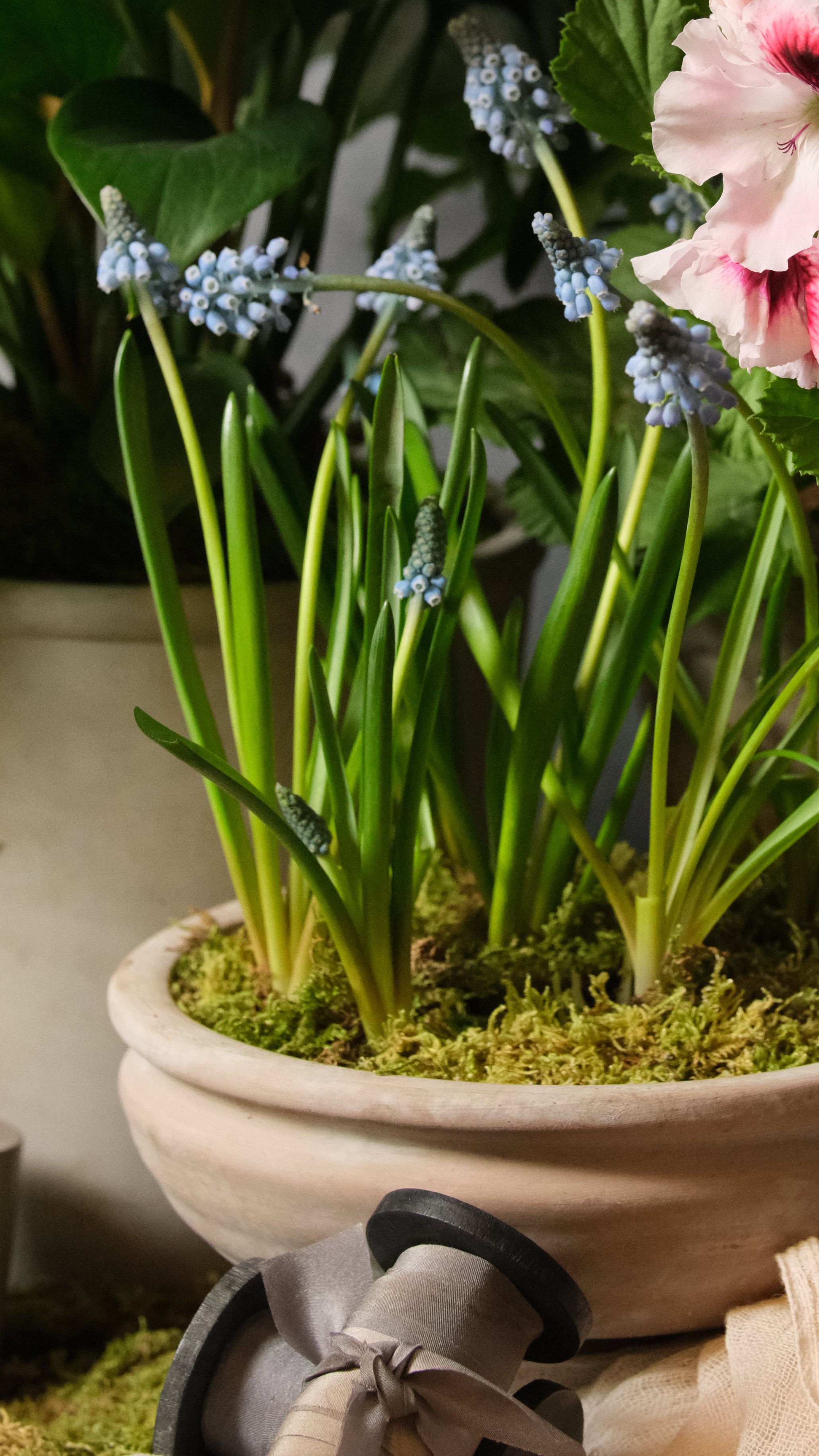 Image 1 of 8
Image 1 of 8

 Image 2 of 8
Image 2 of 8

 Image 3 of 8
Image 3 of 8

 Image 4 of 8
Image 4 of 8

 Image 5 of 8
Image 5 of 8

 Image 6 of 8
Image 6 of 8

 Image 7 of 8
Image 7 of 8

 Image 8 of 8
Image 8 of 8









Curated Spring Planters
Spring muscari bulbs and geraniums carry a charming array of cultural significance, each adding its own unique touch to the tapestry of human traditions and symbolism. Muscari bulbs, often known as grape hyacinths, have deep roots in Persian culture, where they symbolize the arrival of spring and the renewal of life, particularly during Nowruz, the Persian New Year. Their delicate blooms, reminiscent of clusters of grapes, evoke themes of abundance, vitality, and the promise of new beginnings. Across various cultures, the vibrant blue hue of muscari petals has inspired poets, artists, and garden enthusiasts alike, symbolizing tranquility, fidelity, and the boundless expanse of the sky.
In contrast, geraniums bring their own rich cultural heritage to the table. With origins in the Mediterranean region, geraniums have been cherished for centuries for their lush foliage and vibrant blossoms. In the language of flowers, geraniums are often associated with sentiments of love, friendship, and happiness, making them popular choices for bouquets and garden arrangements. Additionally, geraniums have historically been used for their medicinal properties and aromatic qualities, finding their way into festivals, ceremonies, and herbal remedies across cultures.
Together, these living symbols provide a charming portrait of cultural diversity and shared human experiences, reminding us of the enduring significance found in nature's simple yet profound gifts. Whether adorning gardens, festivals, or rituals, spring muscari bulbs and geraniums embody the timeless themes of renewal, love, and the beauty of life's ever-repeating cycles.
Spring muscari bulbs and geraniums carry a charming array of cultural significance, each adding its own unique touch to the tapestry of human traditions and symbolism. Muscari bulbs, often known as grape hyacinths, have deep roots in Persian culture, where they symbolize the arrival of spring and the renewal of life, particularly during Nowruz, the Persian New Year. Their delicate blooms, reminiscent of clusters of grapes, evoke themes of abundance, vitality, and the promise of new beginnings. Across various cultures, the vibrant blue hue of muscari petals has inspired poets, artists, and garden enthusiasts alike, symbolizing tranquility, fidelity, and the boundless expanse of the sky.
In contrast, geraniums bring their own rich cultural heritage to the table. With origins in the Mediterranean region, geraniums have been cherished for centuries for their lush foliage and vibrant blossoms. In the language of flowers, geraniums are often associated with sentiments of love, friendship, and happiness, making them popular choices for bouquets and garden arrangements. Additionally, geraniums have historically been used for their medicinal properties and aromatic qualities, finding their way into festivals, ceremonies, and herbal remedies across cultures.
Together, these living symbols provide a charming portrait of cultural diversity and shared human experiences, reminding us of the enduring significance found in nature's simple yet profound gifts. Whether adorning gardens, festivals, or rituals, spring muscari bulbs and geraniums embody the timeless themes of renewal, love, and the beauty of life's ever-repeating cycles.
Includes one uniquely curated seasonal designers’ choice Planter ‘Spring Bulbs’
* Includes: planter pot (1), your selected size of our seasonal designer floral planter (1), care card (1)
